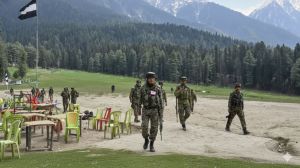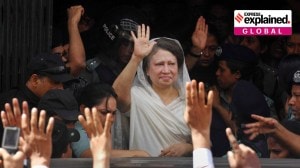Hunterwali
SOON after she came to power in 1994, Chandrika Bandaranaike Kumaratunga, 58, wrote several letters to LTTE chief Vellupillai Prabhakaran te...

SOON after she came to power in 1994, Chandrika Bandaranaike Kumaratunga, 58, wrote several letters to LTTE chief Vellupillai Prabhakaran telling him she wanted to embark on a serious effort to end the 11-year civil war in Sri Lanka. The only response she received was increased violence, bomb blasts and a numbingly high death toll.
On a trip to New Delhi soon after, Chandrika was invited to speak at the Jawaharlal Nehru University, where she expressed the same sentiment for peace. That8217;s when two students presented her with their Phd dissertations on the LTTE. 8216;8216;It wasn8217;t as if she needed reminding about the fascist face of the Tamil Tigers,8217;8217; one observer recounted, 8216;8216;after all, her husband had been assassinated by the LTTE only a few years before.8217;8217;
Certainly, Chandrika had never been a stranger to the inevitability of death by bullet. As a 14-year-old in 1959, her father Solomon Bandaranaike was assassinated, catapulting her mother Sirimavo into the Sri Lankan limelight.
As a child, Chandrika loved doing things many young girls are wont to do 8212; playing the piano, writing poetry and acting in school plays. In Paris in the 1960s she spread her wings and is supposed to have participated in the 1968 events. When she married film actor Vijaya Kumaratunga in 1978, much of Colombo felt she was going way beneath her class.
She loved him deeply, though. In 1988, just four days short of their 10th wedding anniversary, he died in her arms, assassinated by an LTTE squad. Sri Lankans never forgot the picture of the young widow, clenching her fists as she stood by her husband8217;s bier. But she left for Europe soon after, taking her children Yasodhara and Vimukthi with her.
Years later, in 2000, Chandrika was to herself escape death by a whisker when, at a political rally, she stopped to talk to a television journalist. The suicide bomber8217;s meticulous planning claimed some bystanders. Chandrika survived but lost an eye.
As the LTTE continued with its deathly dance, the president took the fight into the Tigers8217; lair. Night after night she would sit with her army generals, goading them to retake Jaffna. They did. The LTTE was humiliatingly pushed beyond Elephant Pass, the first time in years.
8216;8216;Just as she sought to pursue peace with the Tigers, she was equally dogged, committed and sincere about fighting a war,8217;8217; a Sri Lanka watcher said.
That fighting spirit was in full flow earlier this week when Chandrika summarily suspended parliament, took over the portfolios of the defence, interior and information ministers and sent troops to guard key installations in Colombo.
Accusing Prime Minister Ranil Wickeremasinghe8217;s government of making too many concessions to the LTTE, Chandrika invoked her considerable powers to simply take over the country.
Ranil was left spluttering for support in the US. He stayed on to keep his appointment with President George W. Bush, whose very flattering remarks on the Sri Lankan prime minister caused not a few raised eyebrows back in south Asia.
Chandrika8217;s bluntly stated view about Ranil8217;s pandering to the Norwegians and their sponsored peace process has, especially in the past few months, found takers in India. As a silent but major player in the Sri Lankan situation, New Delhi has been somewhat uncomfortable with the western emphasis on the Tigers8217; human rights.
So when Chandrika openly called for sacking the chief Norwegian monitor a few months ago, New Delhi was not unduly unhappy. According to one observer, 8216;8216;Ranil wanted peace with the Tigers at any cost. Chandrika, on the other hand, wanted peace within the framework of devolution.8217;8217;
- 01
- 02
- 03
- 04
- 05































